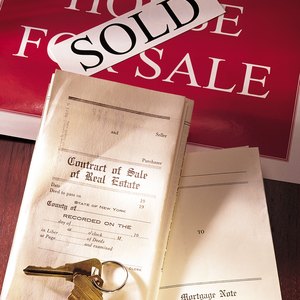
State and local government authorities may use real estate taxes to raise revenues for government services. These taxes are based on the value of your home, so two people in similar circumstances with similar property values should pay relatively equal property taxes. The market value is the price that you would receive if you sold your home on the open market. The assessment value measures the value of your home that the tax is based on.
Contact the local taxing governmental authority to figure the assessment rate and the tax rate. The assessment rate measures the percentage of a home's value subject to the property taxes. The tax rate calculates the property tax based on the home's assessed rate.
Divide the assessment rate and the tax rate expressed as percentages by 100 to convert them to decimals. For example, if the assessment rate equals 20 percent and the tax rate equals 4 percent, divide 20 and 4 by 100 to get 0.2 and 0.04.
Divide the property tax bill by the tax rate expressed as a decimal to find the assessed value. For example, if the property tax on your home equals $900 and the tax rate equals 0.04, divide $900 by 0.04 to find the assessed value of your home equals $22,500.
Add the value of any exemptions from the property tax to the assessed value of the home. For example, if your locality offers you a $5,000 exemption because you are a veteran, add $5,000 to $22,500 to get $27,500.
Divide the assessed value of your home plus any exemptions by the assessment rate to find the market value of the home. In this example, divide $27,500 by 0.2 to get a market value of $137,500.
References
- City of Midland Michigan: How Property Taxes are Calculated
- Internal Revenue Service. "4.48.6 Real Property Valuation Guidelines." Accessed April 10, 2020.
- State of New Jersey. "Property Tax." Accessed April 11, 2020.
- Internal Revenue Service. "Topic No. 151 Your Appeal Rights." Accessed April 11, 2020.
Writer Bio
Based in the Kansas City area, Mike specializes in personal finance and business topics. He has been writing since 2009 and has been published by "Quicken," "TurboTax," and "The Motley Fool."

